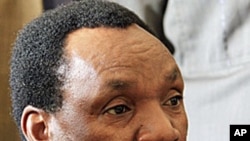As the Kenyan government returns for the New Year, the 'War on Graft' is heating up in the capital, but some are hitting back at allegations, accusing opponents of playing politics with the anti-corruption crusade.
Just four days into 2011, the Kenyan Anti-Corruption Commission added yet another member of Kenya’s Cabinet to its list of high-profile targets.
On January 4, Industrialization Minister Henry Kosgey was charged by the KACC with abuse of his office for his role in the illegal importation of used automobiles into Kenya in 2010.
Facing removal from office under the Anti-Corruption and Economic Crimes Act, Kosgey instead decided to step aside later in the day.
"I have today written to his excellence the president and the right honorable prime minister, offering to step aside as minister for industrialization to allow for these charges to be fully investigated," he stated.
Kosgey is the fourth Cabinet minister to be hit with corruption charges since late 2010.
The list also includes Foreign Affairs Minister Moses Wetang’ula, Higher Education Minister William Ruto and Water Minister Charity Ngilu.
His resignation makes him the fourth Cabinet minister from the Orange Democratic Movement to be targeted by the anti-corruption body. The Orange Democratic Movement is the country’s main opposition group and part of the Government of National Unity formed in 2008 after the country’s post-election violence.
Some members of the Orange Democratic Movement are charging the so-called "War on Graft" is unfairly targeting opposition members. Parliament Member John Mbadi called Kosgey’s case harassment and declared Wednesday the party would not allow the victimization of its members.
Appointed Parliament Member Rachael Shebesh further demanded an investigation into some of Kenya’s other infamous corruption scandals. "When will the big issues be dealt with? When will Kenyans see Anglo-Leasing be dealt with? When will we see issues of Goldenberg being completed? When will we see issues of Triton being hit on the nail?" she asked.
The ruling Party of National Unity hit back instantly, accusing the Orange Democratic Movement of playing politics with anti-corruption efforts. But many fear the tenure of Anti-Corruption chief Patrick Lumumba, which has been praised by both local and international observers, could become mired in Kenyan politics.
Government Spokesperson Alfred Mutua is calling for calm on both sides. “The president and the prime minister have been very clear for a long time that the fight against corruption is not targeted at any particular group,” Mutua says, “or any particular political association, or any particular religion. The fight against corruption is a fight against individuals."
Mutua told reporters the anti-corruption investigations would target anyone suspected of graft, regardless of political affiliation.
Anti-Corruption Chief Lumumba also assured Kenyans that other "big fish" are under investigation for graft.
But there are still concerns that the country’s largest players will evade prosecution. Recently leaked cables from the US Embassy in Nairobi identified both President Mwai Kibaki and Prime Minister Raila Odinga as part of the problem, with vested interests in the status quo. Both leaders have vehemently denied involvement in theft or corruption.
Kenya has struggled with corruption during its nearly 50-year history. In 2010 Kenya was ranked 154 out of 178 countries in Transparency International’s annual corruption perception index. The Berlin-based organization also ranked Kenya’s police, Judiciary and Nairobi City Council as among the most corrupt institutions in East Africa.
Kenya’s Finance Ministry has estimated about $3.3 billion, more than one quarter of Kenya’s national budget, are lost through corruption annually.




